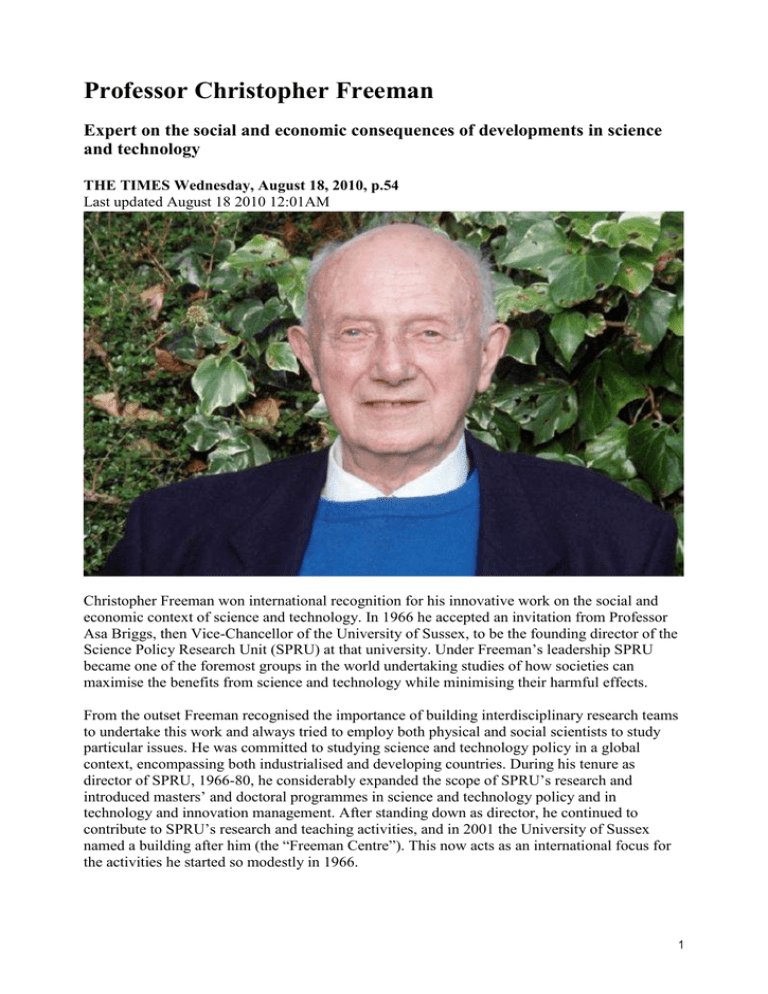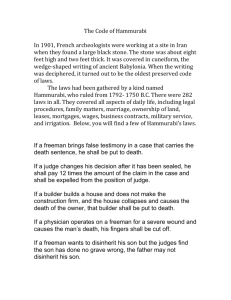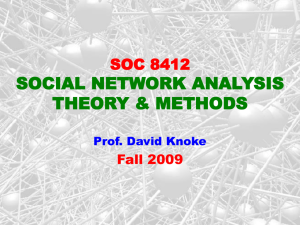Chris Freeman Times obit
advertisement

Professor Christopher Freeman Expert on the social and economic consequences of developments in science and technology THE TIMES Wednesday, August 18, 2010, p.54 Last updated August 18 2010 12:01AM Christopher Freeman won international recognition for his innovative work on the social and economic context of science and technology. In 1966 he accepted an invitation from Professor Asa Briggs, then Vice-Chancellor of the University of Sussex, to be the founding director of the Science Policy Research Unit (SPRU) at that university. Under Freeman’s leadership SPRU became one of the foremost groups in the world undertaking studies of how societies can maximise the benefits from science and technology while minimising their harmful effects. From the outset Freeman recognised the importance of building interdisciplinary research teams to undertake this work and always tried to employ both physical and social scientists to study particular issues. He was committed to studying science and technology policy in a global context, encompassing both industrialised and developing countries. During his tenure as director of SPRU, 1966-80, he considerably expanded the scope of SPRU’s research and introduced masters’ and doctoral programmes in science and technology policy and in technology and innovation management. After standing down as director, he continued to contribute to SPRU’s research and teaching activities, and in 2001 the University of Sussex named a building after him (the “Freeman Centre”). This now acts as an international focus for the activities he started so modestly in 1966. 1 Freeman was a quiet, effective, inspirational leader, commanding loyalty from his colleagues and the support of many funding agencies. He took a great interest in the research of postgraduate students. Indeed there can be few science and technology policy groups in the world which have not benefited in some way from his inspiration as a mentor, lecturer and teacher. He invariably succeeded in identifying what were the most important emerging policy issues in stimulating others, including funding bodies, to take an interest in them, thus bringing SPRU to the forefront of research in these areas. The research results generated by Freeman and his colleagues contributed to major public debates in many key areas and thereby to the wider policy-making process. (L-R): Prof David Watson, Prof Ben Martin, Prof Christopher Freeman, Prof Howard Rush and Prof Alasdair Smith at the turf laying ceremony for the new Freeman Centre University of Sussex Freeman’s early empirical studies of technological innovation in different industries led to his groundbreaking book The Economics of Innovation, which was reprinted and updated several times. In this book he successfully demonstrated the key role played by technical innovation in economic competitiveness. He also led teams which undertook major studies on technology and employment and on social and technological alternatives for the future, the latter work (reflected in his book The Economics of Hope) providing an alternative view to that associated with the doomsday “limits to growth” models which had received wide publicity at the time. Together with the Venezuelan researcher Carlota Pérez, Freeman built on the ideas associated with Schumpeter and Kondratiev relating to cycles or “long waves” of economic development which, they argued, stemmed from major new technological innovations, the most recent being the information technology revolution. Freeman coined the phrase “national system of innovation” to describe the institutions in Japan which had combined to make that country a major player in technological development in the 1980s. This concept was further developed by others but is still the basis of much of the thinking and action on science and technology policy in both developed and developing countries. 2 The Freeman Centre, at the University of Sussex, named after Professor Christopher Freeman Christopher Freeman was born in Sheffield in 1921. His father, Arnold Freeman, was an early Fabian and a convert to the ideas of Rudolf Steiner. In keeping with Steiner’s ideas about education, he gave free rein to his son’s radical inclinations and thought the progressive style of Abbotsholme School in Staffordshire would bring out the best of his talents. While there Freeman and some friends, founded a Young Communist League cell and launched a radical magazine called Schools Forward. When he moved to the LSE, then evacuated to Cambridge, he quickly became a significant figure in the student movement. He was much influenced by the ideas of J. D. Bernal, the Communist “sage of science”, and never lost his early Marxist interest in the interaction between theory and practice. However, his well disciplined mind and realistic temperament did not permit him to succumb to ideological cant. Interestingly he actually enjoyed his posting to the royal bodyguard at Balmoral in 1944 when, as a staunch anti-fascist and an officer in The Manchester Regiment, he might have preferred an earlier posting to his anti-tank unit in Normandy. He was well aware of this social irony. After leaving the Army in 1945 and completing his studies at LSE, Freeman worked first for the Post Office and then joined the London Export Group, helping to find markets in the UK for Soviet and Chinese products. Later he was recruited by the National Institute of Social and Economic Research to work on a series of projects studying innovation in different industrial sectors. He was also engaged as a consultant to the Organisation for Economic Co-operation and Development and in 1963 became one of the leading authors of the so-called Frascati Manual, which set the standard definitions of research and development used by successive generations of statisticians in national statistical offices. Even in his early postwar career when Freeman took some time to develop his early Marxism into a more sophisticated approach to science and technology, he was always pushing the 3 frontiers of significant research with that combination of charm and intelligence that made him both likeable and effective. He broke his connection with the Communist Party when the Soviet Union invaded Hungary in 1956. Freeman was a staunch supporter of Sheffield Wednesday Football Club and Yorkshire County Cricket Club, and he was a keen birdwatcher. He had a strong belief in the ability of people to mobilise technology for the benefit of all humankind. He will be remembered for his great optimism, his modesty, his inspirational encouragement to young people and his ability to recognise only the most positive qualities of all his friends and colleagues. Freeman married first Peggotty Selsun, who died in 1971, secondly Margaret (Maggie) Young (marriage dissolved) and finally, in 2007, Carlota Pérez. She survives him, together with two sons and two daughters from his first marriage and by one daughter from his second. Professor Christopher Freeman, science policy guru, was born on September 11, 1921. He died on August 16, 2010, aged 88 4


